PLEASE NOTE:
While the following article relates to your Google search, the services and methods at Goodwin Hypnosis may differ from those mentioned below. Since 2007, we have helped thousands of clients to overcome emotional and behavioral challenges when all else had failed. According to many of them (and their referring healthcare providers), our methods are faster than talk therapy, easier than willpower, and safer than medication. If you’re ready to resolve your issues, skip the article and visit the rest of our website, where you can learn about our unique approach, watch client testimonial videos, and discover how working with us one-on-one could be the solution you’ve been searching for.
Introduction
Navigating the landscape of emotions can often feel overwhelming and complex. Emotions, whether joyful or challenging, play a significant role in shaping our experiences and interactions. To foster a healthier emotional life, it is crucial to develop strategies for recognizing, managing, and understanding these feelings.
The journey begins with acknowledging and identifying emotions, followed by creating space to regulate them through mindful breathing practices. Grounding techniques and mindfulness are essential tools that bring us back to the present moment, helping us manage intense emotions more effectively. Exploring emotional triggers through practices like journaling offers valuable insights into our emotional patterns, while letting go of the storylines we create around our emotions aids in focusing on what we can control.
Integrating mindfulness and self-compassion into daily routines can transform emotional regulation, fostering resilience and emotional intelligence. As we build these skills, we not only enhance our well-being but also cultivate deeper connections and understanding in our relationships.
Acknowledge and Identify Your Emotions
Identifying what you are experiencing is the first step in managing your feelings effectively. Start by checking in with yourself and asking questions like: What am I feeling right now? Is it anger, sadness, frustration, or something else? Identifying your feelings can assist you in comprehending them more effectively and establishing a route toward regulation.
Understanding the emotion-generative process can also assist in this journey. Psychologist James Gross developed a model that highlights how emotions are generated through a series of stages: situation, attention, appraisal, and response. For instance, identifying a situation that triggers a reaction, such as a public speaking event, and then noticing how your focus and thoughts about the event shape your experience, can provide crucial insights.
Moreover, learning about how fight, flight, freeze, or fawn responses manifest in your body can help develop an internal template for recognizing and soothing your nervous system. By paying attention to these physiological cues, you can better manage your reactions and maintain your well-being.
'Participating in thoughtful discussions with reliable friends or counselors can further clarify your feelings by offering an outside viewpoint, assisting you in developing a more detailed comprehension of your experiences.'. As Cruz explains, developing emotional awareness enables you to respond more constructively to your feelings, ultimately fostering better mental and psychological health.
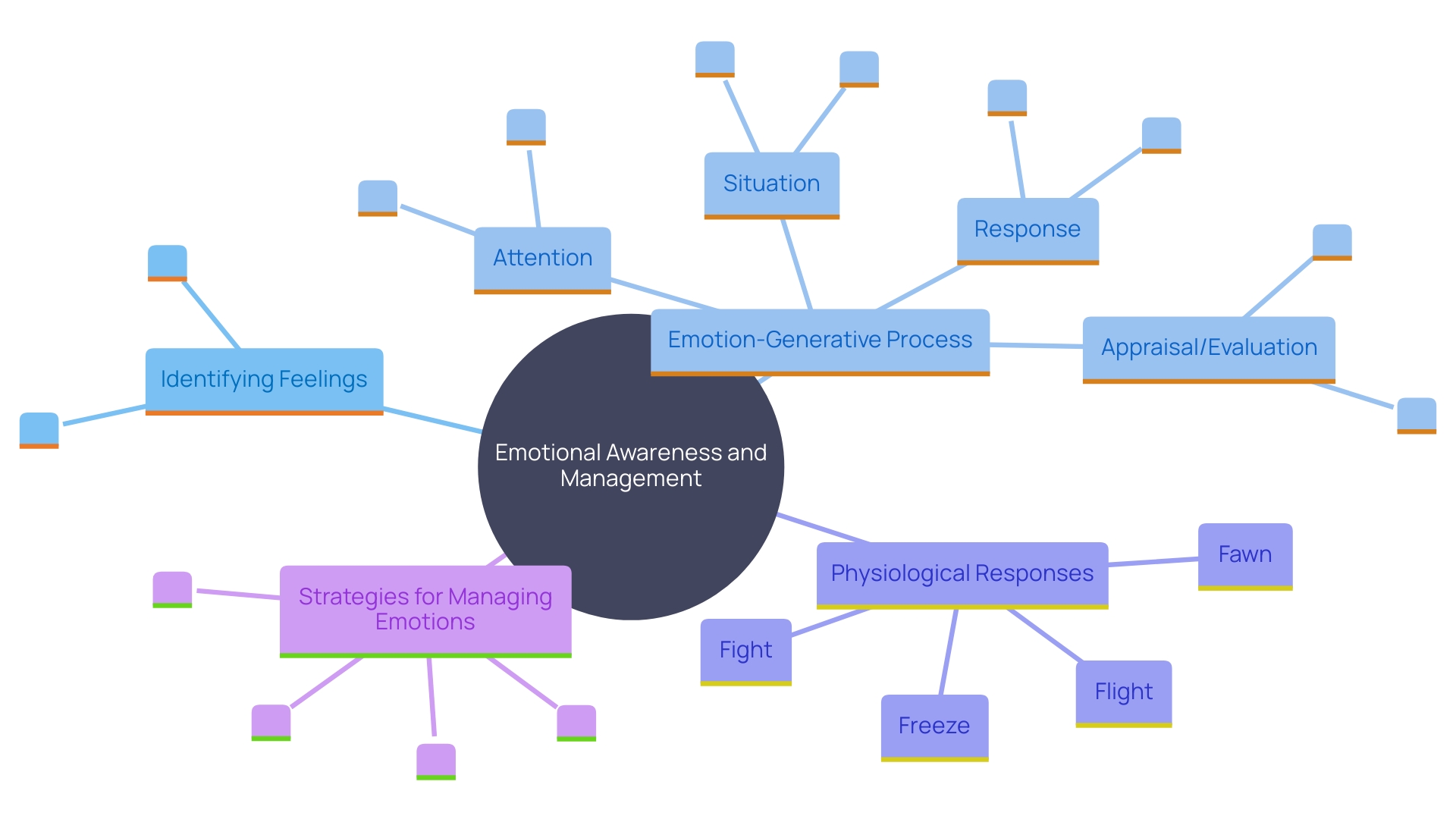
Pause and Breathe: Creating Space to Regulate Emotions
When feelings run high, it’s essential to create a pause. Take a deep breath or two, allowing the air to fill your lungs completely before slowly exhaling. This simple act can help you regain composure and clarity. Use this moment to assess the situation without immediately reacting. Breathing exercises, such as the 4-7-8 technique or box breathing, are powerful tools to regulate feelings. The 4-7-8 method involves inhaling softly through your nose for 4 seconds, holding for 7 seconds, and exhaling slowly for 8 seconds. Box breathing, used by military personnel and athletes, involves inhaling, holding, exhaling, and holding again for counts of four. These techniques can quickly bring you from a heightened emotional state to a more relaxed one. Research from Yale University and other studies have shown that breathing exercises are among the most effective ways to manage feelings in real-time. For instance, veterans who practiced SKY Breath meditation saw significant reductions in anxiety and post-traumatic stress in just a week. By incorporating breathwork into your daily routine, you can open the door to a more balanced, healthy, and mindful life.
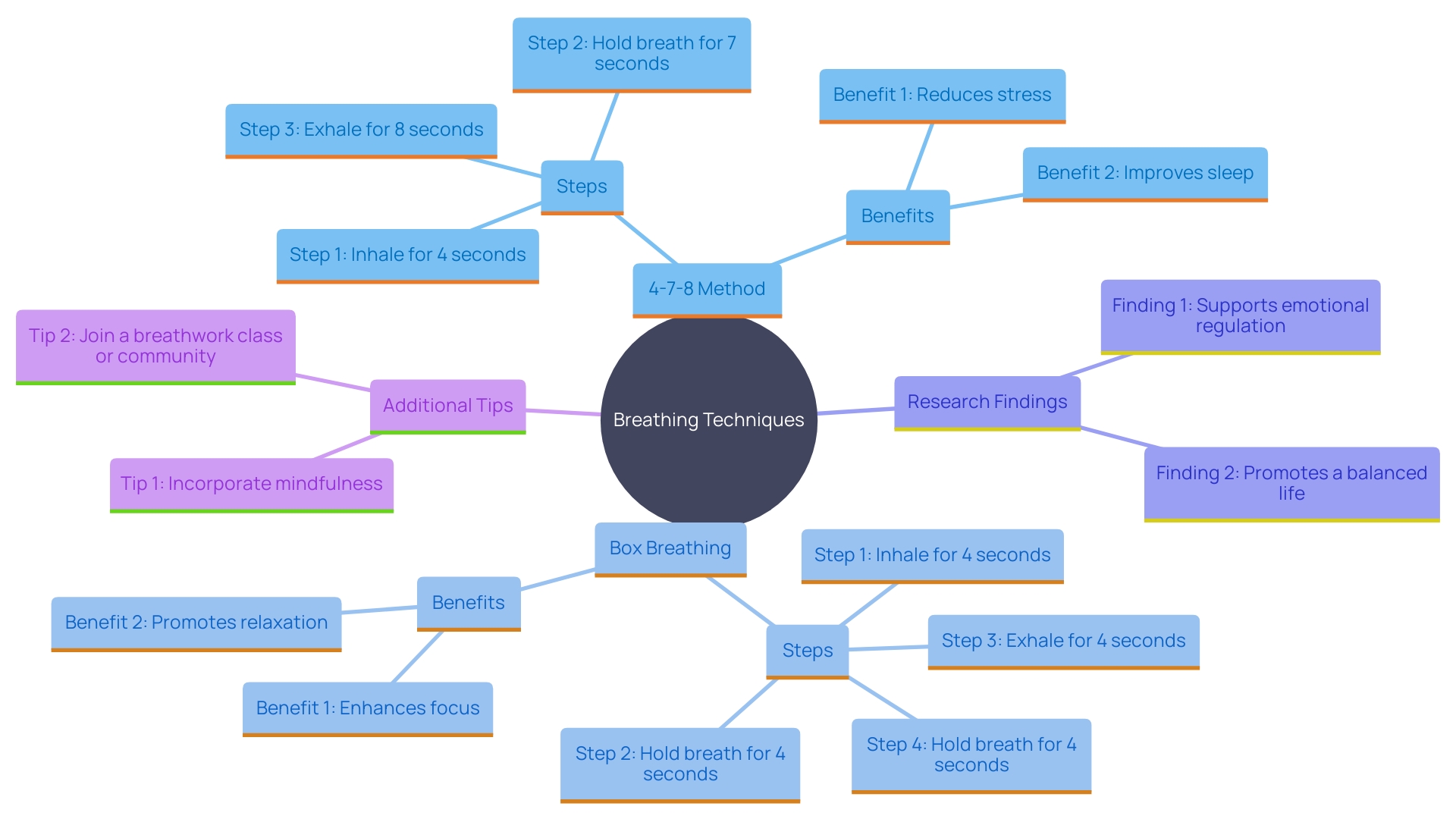
Ground Yourself: Physical Awareness Techniques
To improve your ability to manage feelings, engage your senses. Focus on your feet touching the ground, the texture of an object nearby, or the sounds around you. This anchoring technique can bring you back to the present moment, allowing you to detach from overwhelming feelings and regain control. Research supports the effectiveness of grounding techniques. For instance, a study on veterans who underwent SKY Breath meditation showed significant reductions in anxiety and post-traumatic stress, with effects lasting up to a year. Grounding can also involve using different temperatures, such as holding an ice cube or a warm washcloth, to create a sensory connection. Experts like Amie DiTomasso emphasize that grounding helps dampen the sympathetic nervous system response, aiding in reestablishing a stable state. Additionally, music can be used to ground yourself by concentrating on the lyrics or instrumentals, further helping to anchor you in the present moment.
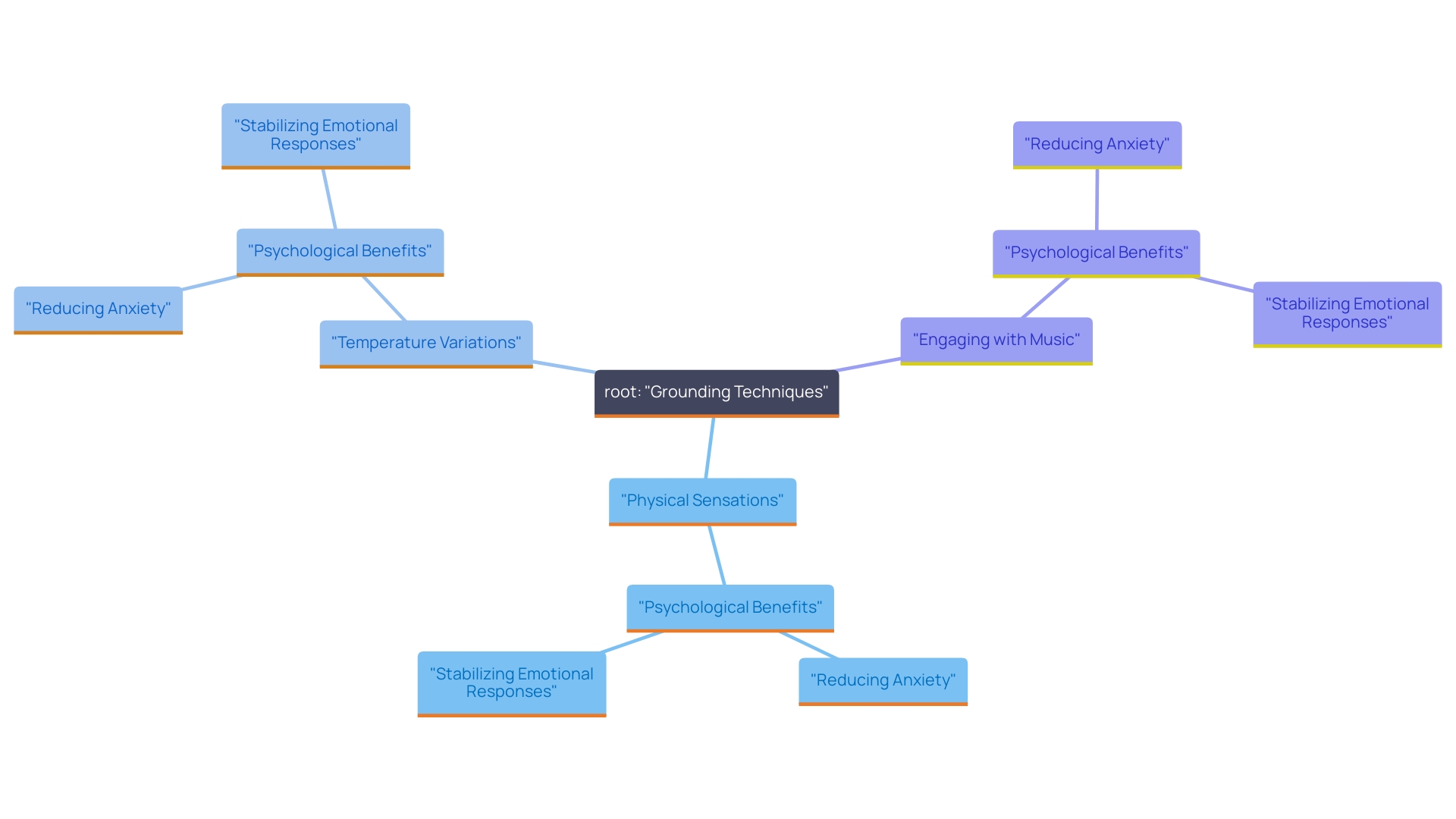
Accept Your Emotions: Mindfulness and Non-Judgmental Awareness
Instead of resisting or pushing away your feelings, embrace them with acceptance. Understand that it's natural to experience a wide range of feelings. Mindfulness encourages you to notice these feelings without categorizing them as positive or negative. This practice, rooted in ancient Buddhist and Hindu traditions, helps you stay present and recognize your feelings without judgment. By validating your emotions, you open the door to healing and gain insight. As Kristin Neff, PhD, highlights, awareness is crucial for psychological resilience and recovery. Supporting this, research from the Mayo Clinic highlights that mindfulness can reduce physical and mental stress and can be easily practiced anywhere. This approach has also demonstrated potential in preventing depression relapse, proving its effectiveness in long-term mood management.
Explore Your Emotions: Understanding Triggers and Patterns
Reflecting on what might have triggered your emotional response is a crucial step in managing your feelings. Maintaining a journal can act as a powerful tool to assist you in identifying patterns and common triggers. Mindful journaling has been shown to be an effective method for processing events, especially those related to major life transitions or significant losses. By focusing on a particular event, you can bring perspective, clarity, and greater self-compassion.
Furthermore, studies have shown that mindful journaling not only helps in processing feelings but also boosts awareness and gratitude. The act of writing down moments of gratitude can reignite those feelings in our brains, allowing us to experience their sweetness all over again. Journaling is versatile and flexible, making it a sustainable practice for growing mindful awareness.
For instance, the Feelings Journal, created by feelings exploration expert Amber Rae, is designed to help individuals engage with their emotions on the page, moving them toward inner peace. This tool has been endorsed by therapists and utilized by numerous individuals, emphasizing its effectiveness in fostering a kinder, more curious, and compassionate connection with one's inner world.
Comprehending your feelings triggers through journaling enables you to react differently in the future, fostering a sense of control over your psychological landscape. As Paul Ekman, a well-known psychologist, suggests, our feelings are influenced by our physiological state and past experiences. By extracting information from your journaling practice, you can reveal insights into your needs and preferences, assisting you in managing your feelings more effectively.
Let Go of the Story Line: Focusing on the Present Moment
Often, we get caught up in the narratives we create around our emotions. Instead of dwelling on past events or worrying about future outcomes, redirect your focus to the present moment. Ask yourself: What can I control right now? This shift can alleviate anxiety and encourage mental stability.
Mindfulness, a practice rooted in being present, has shown promising results in reducing stress, anxiety, and loneliness. Neuroscientist David Creswell from Carnegie Mellon University emphasizes that awareness practices can broadly lessen suffering and depressive symptoms. For example, an elementary school in Florida established a daily awareness program, which significantly benefited the students by enhancing their focus and emotional stability.
Practicing mindfulness can help break the cycle of repetitive negative thinking, which often contributes to the maintenance of both depression and anxiety. By focusing on the present moment and acting with awareness, individuals can reduce stress reactivity and improve their overall mental health. Mindfulness also promotes body awareness, enabling individuals to identify and react to internal physical signals without judgment, which is essential for handling feelings effectively.
Eve Ekman, a contemplative social scientist, emphasizes the importance of emotional awareness in cultivating happiness and resilience. She draws from her extensive experience in meditation and integrative medicine to assist individuals in handling their feelings through awareness practices. Ekman’s insights are backed by studies indicating that awareness can positively influence mental well-being by encouraging a non-judgmental observation of one's emotions and bodily sensations.
Incorporating mindfulness into daily life, even for just five to fifteen minutes, can bring about significant benefits. Research has shown that this simple practice can enhance brain function, reduce negative physical and mental symptoms, and promote resilience. By concentrating on the present and what you can manage, you can establish a more stable and tranquil state of feelings, effectively handling the challenges that life offers.
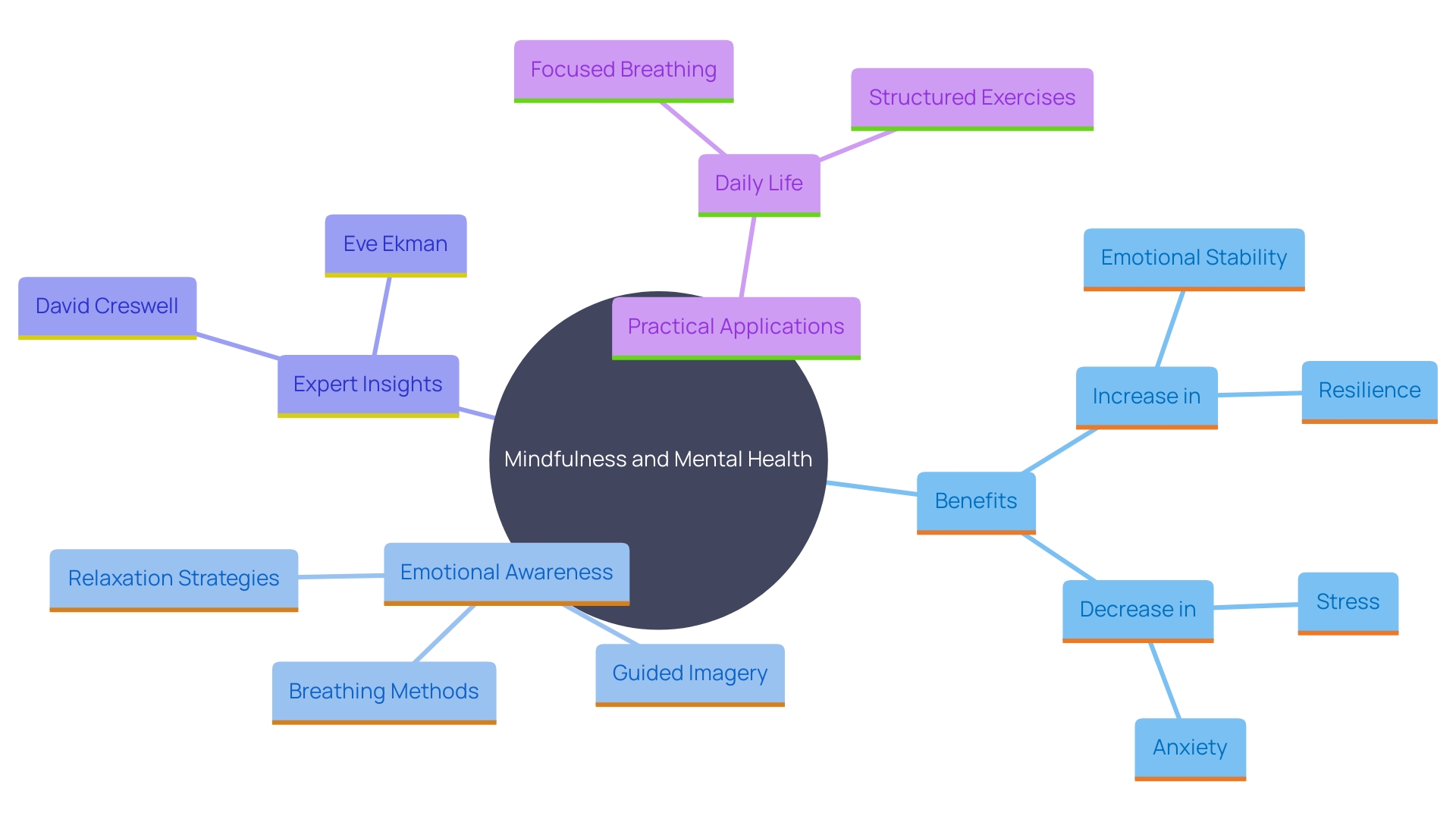
Practice Mindfulness and Self-Compassion: Long-Term Strategies
Incorporating awareness into your daily routine can be a transformative practice for emotional regulation. Engaging in activities such as meditation, yoga, or mindful walking not only keeps your brain fit but also enhances your ability to manage emotions effectively. Research has shown that just five to 15 minutes of daily meditation can significantly improve mental and physical well-being, reducing symptoms of anxiety and depression.
Combining awareness with self-compassion is especially potent. Self-compassion involves treating yourself with the same kindness and understanding you would offer a close friend. It has three main components: self-kindness, mindfulness, and a sense of common humanity. This method encourages resilience and social intelligence, assisting you in managing life's difficulties with more ease. Research has shown that self-compassion is closely linked to improved well-being, healthier habits, and more fulfilling relationships.
The combination of mindfulness and self-compassion creates a state of warm, connected presence during difficult moments. This inner resource is crucial for increasing resilience and mental strength. For example, during the early days of the COVID-19 pandemic, participants in a study who practiced self-compassion reported higher well-being and better stress management. This highlights the importance of developing self-compassion, especially during times of uncertainty and change.
Overcoming Barriers: Building Resilience and Emotional Intelligence
Developing self-control is a journey, and it's normal to face obstacles along the way. Developing resilience is crucial, as it allows us to view challenges as opportunities for growth. According to George Bonanno, resilience is the ability to maintain stable psychological and physical functioning in the face of adversity. Resilient individuals may still experience distress, but they bounce back relatively quickly.
Emotional intelligence (EI) plays a vital role in this process. It involves a blend of empathy, self-awareness, and communication skills that enable us to connect deeply with others and handle challenging situations with grace. Marc Brackett, a researcher on emotional intelligence, defines it as the ability to demonstrate self-awareness and self-regulation, show empathy, and cultivate social skills that help navigate difficult issues.
Empathy, a fundamental element of EI, serves as a superpower for comprehending and handling feelings, both in ourselves and in others. Grit Hein's research emphasizes that empathy thrives in an atmosphere of mutual respect, making it essential for fostering positive and meaningful relationships. This corresponds with the notion that fostering a healthy connection with our feelings is vital for our overall well-being.
In practical terms, enhancing social awareness can have significant benefits in various areas of life, including personal and professional settings. For instance, primary care physicians who develop measurable EI skills can improve their well-being and workplace performance. The ability to read social cues and navigate social situations with finesse can lead to better teamwork, reduced errors, and healthier coping strategies.
Ultimately, developing self-control and resilience is a continuous journey that involves self-reflection and understanding both our own feelings and those of others. By embracing this journey, we can develop the emotional intelligence needed to overcome challenges and thrive in our personal and professional lives.
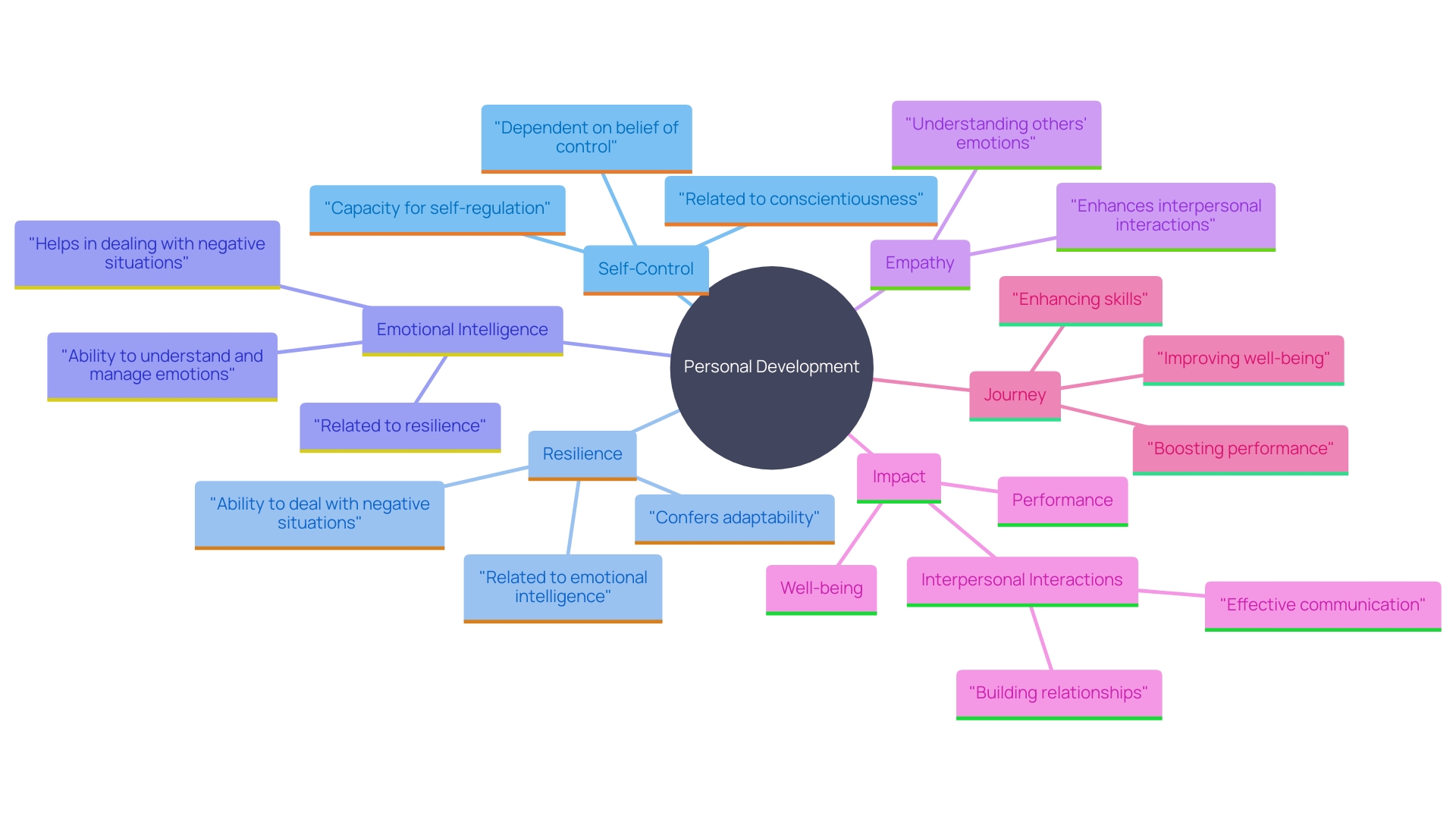
Conclusion
Navigating the complexities of emotions is a journey that requires patience and understanding. Acknowledging and identifying feelings is the first step, allowing individuals to create a pathway for effective emotional management. By recognizing physiological responses and engaging in reflective conversations, a deeper awareness of emotions can be cultivated, leading to healthier mental and emotional states.
Creating space through mindful breathing techniques is essential in regulating emotions during high-stress moments. Techniques such as the 4-7-8 method and box breathing can provide immediate relief, helping to bring clarity and composure. Grounding techniques further enhance this process, fostering a connection to the present moment and reducing overwhelming feelings.
Embracing emotions with mindfulness and non-judgmental awareness invites healing and resilience. Journaling serves as a powerful tool for understanding emotional triggers and patterns, empowering individuals to respond more constructively. Letting go of unhelpful narratives allows focus on what can be controlled, reducing anxiety and promoting stability.
Incorporating mindfulness and self-compassion into daily routines can transform emotional regulation, creating a warm and supportive inner dialogue. Building emotional intelligence and resilience is a continuous journey, where empathy and self-awareness play crucial roles. By embracing this journey, individuals can foster deeper connections and navigate life’s challenges with grace and strength.




